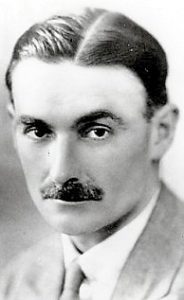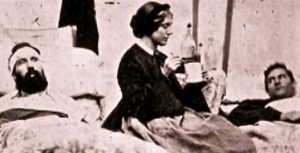
Tending the wounded
Previously in the novel: War Secretary Edwin Stanton holds President and Mrs. Lincoln captive under guard in basement of the White House. Duff and Alethia find pretending to be the Lincolns difficult. Alethia finds herself romantically attracted to Duff.
Another day found Cordie Zook putting away her mop and broom in a small closet of Armory Square Hospital. The sun had already set beyond the Potomac River, which caused her to worry about walking home. If only Miss Dorothea Dix honored her original agreement to allow volunteers to leave before dusk, all would be fine; but as more war casualties filled the long, parallel sheds of the hospital, the volunteers were forced to work later and later. More than ever, Cordie wished she had never left New York City, sure she could have found a job as a maid in a Park Avenue mansion, and Gabby could have been a janitor on Wall Street. Her lip began to quiver, but she commanded herself not to cry. It would do no good. It helped no one, not Gabby, not herself, not these poor broken boys lying in neat rows of cots in front of her.
Gathering her wits, Cordie went to the nurses’ cloak room, where she picked up her coat and hat and went down the line to get Jessie Home’s smart little tam-o’-shanter and plaid jacket. Jessie had become a good friend, Cordie admitted as she left the cloak room and started wandering up and down the aisles of cots, even though the young Scottish woman tried her patience from time to time. For instance, Jessie was never ready to leave when Cordie was desperate to go to Lafayette Park to hear about Gabby from the nervous private. She stopped short in the middle of an aisle and found herself forced to smile as she watched Jessie competently pull a fresh nightshirt over the head of an embarrassed, thin, shockingly pale soldier, who still self-consciously tried to hide the reddish nub that once had been his left arm.
“Now there’s no need for ye to be shamed in front of me,” Jessie said cheerfully as she grabbed the recovering nub and stuffed it into the white, coarse cotton sleeve. “You’re a national hero, and heroes should hold themselves proud.”
“But—but my arm,” the soldier stammered.
She smoothed the shirt down his chest and abdomen. “That’s your badge of manhood,” she replied smoothly. Smiling, she rubbed his white, gaunt cheek with her hand. “That shows you’re no longer a boy. What woman worth being a wife wants to be yoked with a pretty boy when she could have a real man?”
Cordie watched a smile creep across his lips, and she forgot about her fear of crossing the Mall after dark. This was thevolunteers’ purpose, to make the boys smile when other senses told them to cry. If they can do that, they can face the thieves and robbers who hid in the bushes surrounding the Smithsonian.
“It’s time to leave, Jessie,” Cordie said.
The young man looked up at Cordie, and then to Jessie. “You have to leave? You can’t stay a little longer?”
“I’d love to, me hero,” Jessie said, “but Miss Dix wouldn’t hear of it. If she found out I stayed late to sit by ye, she’d think I was tryin’ to romance ye, and then she’d fire me. Ye wouldn’t want me fired, now would ye?”
“I guess not.” His head fell a bit.
“Keep the faith, me hero.” Jessie took her coat from Cordie and put it on. “I’ll see ye again tomorrow.”
“Thank you.” His face brightened.
They walked away and put on their hats as several voices rang out.
“Good night, Miss Home.”
“Thank you, Miss Home.”
“God bless you, Miss Home.”
“I suppose the old lady who mops the floors don’t need a thank you,” Cordie said with a smile, trying not to sound jealous.
“They appreciate ye,” Jessie replied.
“Good night, Miss Zook,” an older voice called out.
“See?” Jessie grinned and grabbed Cordie’s arm. “It just takes maturity to recognize a true angel.”
“You don’t have to use your flowery words on me,” Cordie said, giggling. “Don’t forget. I’m a tough old Yankee.”
Category Archives: Novels
Burly Chapter Three
(Previously in the book: Herman anticipated fifth birthday on the plains of Texas during the Depression. He was overjoyed to receive a home-made bear, but his brother Tad’s ouburst ruined the moment.)
Herman climbed into the loft, took his clothes off and got into bed with Burly. He looked out of the window at the dark sky and thought how lonely he still felt. Burly was wonderful, and he could him hug him; but, Herman still felt lonely and sad. Part of it was because Tad made such a fuss and another was—well, Herman still didn’t know why. Again, as so many nights, tears began to fall from Herman’s eyes.
“Herman,” Burly said in a soft, soothing voice, “please don’t cry.”
Herman looked around. He didn’t know where the voice came from. Then he looked down to see Burly smiling up at him.
“Burly! You’re alive! You can talk!”
“Not so loud,” Burly shushed him. “Yes, I can talk, but only when it’s just you and me. When Callie and Tad, or anyone else is around I’m just a regular stuffed animal.”
“But why?”
Burly wrinkled his brow. “I don’t know. I don’t know why I can talk. But when your tear hit the top of my head I began to talk. That’s all I know.”
“Oh this is wonderful,” Herman whispered, hugging Burly tightly. “Oh! I didn’t hurt you by squeezing too right, did I?”
“Oh no,” Burly replied. “We burlap bears are pretty tough.”
“And you’ll be my friend!”
“Of course, I’ll be your friend,” Burly said. “I’ve been your friend ever since I was that feed bag. Remember, you rode in the pick-up to buy me at the feed store.”
“Not really,” Herman had to admit.
“You impressed me because you were so nice and kind and polite,” Burly explained. “And honest.”
“Thank you.”
“See how polite you are. Do you want to know a secret? I t was really my idea for me to be made into a bear. I made the bag rustle underneath your father’s hand that day so he would notice me and get the idea.”
“I didn’t think papa liked me enough to think of it on his own,” Herman sighed, a bit sad.
“Oh no, Herman,” Burly corrected him firmly. “Your father loves you very much. I could have sat there rustling all day long, but if he hadn’t really wanted you to have a bear, my rustling wouldn’t have meant much.”
“Oh.” Herman was happier knowing his father did love him after all.
“And do you know why he left so quickly after the birthday party?”
“He had to check the horses and cows,” Herman replied innocently.
“Wrong again,” Burly said. “He left because he didn’t want you to see him crying.”
“You mean papa cries? Gosh, I didn’t think anybody that big and strong ever cried.”
“Your father cries all the time, but you and your brother and sister don’t know it. He loves you all very much, and it makes him sad when he can’t give you things.”
“I guess things don’t matter as long as I know papa loves me.”
“Oh my, nice and kind and polite and smart too,” Burly sang. “I knew I was right to want to belong to you.”
Herman smiled a little, then thought of Tad and sighed. “I just wish Tad didn’t hate me.”
“Your brother doesn’t hate you,” Burly said. “He’s just jealous because he never got a stuffed bear. And he’s jealous because he has to go to school and help on the farm more than you do.”
“I do what I can,” Herman protested. “I’m only five.”
“Six. But you see, Tad is still just a little boy, even though he is bigger than you, so he doesn’t understand these things.”
“So maybe when he’s older he won’t hate me,” Herman said hopefully.
“Of course,” Burly assured him. “After all, he is your brother.”
Herman smiled and hugged Burly, knowing he would never feel sad or lonely again. “And you are my friend.”
“Yes, and you are my friend.”
Herman heard Callie and Tad come into the house, muttering and crying. He felt sorry they had gotten into trouble but felt good that they would know better as they got older. Like he would know better as he got older, with the help of Burly Bear, of course. He hugged Burly once more.
“Happy birthday, Burly.”
David, Wallis and the Mercenary Chapter Fourteen
Previously in the novel: Leon, a novice mercenary, is foiled in kidnapping the Archbishop of Canterbury by a mysterious man in black. The man in black turns out to be David, better known as Edward the Prince of Wales. Soon to join the world of espionage is Wallis Spencer, an up-and-coming Baltimore socialite. David kills an ambassador in Shanghai.
Upon his return to London, David cloistered himself inside his suite at York House, a wing of St. James Palace down the mall from Buckingham. He slept in his heavily curtained bedroom for more than twenty-four hours. Once he felt refreshed, David took a long bath, wrapped himself in a plush terrycloth robe and sat down for black coffee and toast. He chatted with his personal secretary Tommy Lascelles, an affable young man who did his best to create reasons for the Prince of Wales to take extended holidays to exotic locales for hedonistic pleasures.
“How was your voyage to the Far East?” Tommy asked, opening his activities book.
“Marvelous,” David replied, sipping his coffee. “Four different very sociable ladies going and coming. Please note when Elvira Chatsworth returns to London. Include me in some event where she is expected to attend. Has Freda called? Arrange dinner for us tonight.”
“I’m afraid that will be quite impossible, sir.” Tommy kept his eyes down as he wrote in his notebook.
“And why is that?”
“Her husband is back in town.”
“Oh, bugger that.”
“It seems his grandmother Mrs. Lavinia Ward is celebrating her ninetieth birthday and all members of the Ward family are required to attend,” Tommy informed him.
“I wish that old bag would die. She’s hampering my love life,” David muttered as he lit a cigarette. He noticed a pause in the conversation. “Do I shock you, Tommy?”
“Of course not, sir.” Clearing his throat, he added, “You must have luncheon at Buckingham Palace today. Your parents have made inquiries and know you are back from your trip to Shanghai.”
“Good God. Now I have to come up with some sort of diplomatic reasons to have been there. Have any ideas?”
Tommy raised his pen from the book and scratched the back of his head with it. “Did you speak to the ambassador?”
“Lord Chatsworth? Only in passing on the Wyndemere.”
“No, no. The other one. Stationed at the embassy. The one who died.”
“I scheduled a luncheon with him but he died the previous evening. That was odd, wasn’t it? So sudden. His head plopped into a bowl of egg nest soup.”
“So you didn’t see him.”
“Oh, I glimpsed him in a crowd. I was within spitting distance but didn’t get a chance to speak.
Tommy groaned. “Spitting distance? Oh the phrases you pick up.” He made a quick note. “I wouldn’t share that one with the King.”
“Actually, I was going to drop it on Mummy. She turns this delightful shade of coral when I embarrass her.”
“Tell your father the Foreign Ministry asked you to drop in on the ambassador. You couldn’t help it if the old man dropped dead.”
“Indeed not.”
“Oh. Your tailor is waiting outside.”
David’s face lit. “Does he have the plaid slacks ready?”
Tommy arched an eyebrow. “I wouldn’t know.”
“Send him in.”
David noticed Tommy took special care not to slam his activities book shut. Poor chap, the prince thought. Such a decent fellow. I must shock him terribly, however MI6 specifically instructed me not to include Tommy in my secret activities. After all, he is a decent fellow.
Tommy opened the door. A short, rotund man with strands of black hair slicked across his glistening dome jiggled into the prince’s boudoir, extending a pair of slacks to his highness.
“Just as you required.” The tailor beamed.
David hid a smile as he observed Tommy rolling his eyes before exiting, closing the door behind him.
“I think you will find the crotch to be perfection,” the man announced in a loud voice.
“No need for that,” David informed him. “Tommy is not the type to linger around keyholes.”
“You never know about these blokes around here.” The man slipped into a very comfortable Cockney. He looked at the pants with askance and tossed them on a chair. “Are you really going to wear those togs, are you?”
David wagged a finger at him. “Now, now. It’s your attitude that keeps you from getting assignments to nice places.”
“You can keep your nice places. They give me the heeby geebies.” He leaned in. “Did the capsule work as anticipated?”
“Perfectly. The timing was chancy, biting and spitting at the same time. One good cough and I’d been the one with his face in a bowl of soup.”
The man smiled, revealing that a couple of his canines were missing. “Dee-lightful, ain’t they? We got the poison from a new agent we picked up from America. She’s a mean one, for sure. And she knows her herbs up in those Blue Ridge Mountains. She’s got a different one for every which way you want a man to die, she does.”
“I don’t like it when you tell me too much,” David informed him.
“Bah. It’s the only fun me and me old lady have in this business.” He paused to appraise the prince. “I keep forgetting you’re one of those royal blighters.”
David laughed. “Us royal blighters love gossip too. No, the less we know about each other the safer we are. And I don’t want anything to happen to your wife or yourself. Truly. No disrespect intended.”
“It’s hard to stay mad at a bloke like you, David.” The man grumbled and turned for the door.
“A man from the organization was there in Shanghai,” the prince whispered. “He almost ruined the whole gambit. Tried to shoot the ambassador. I knocked his gun away.”
He looked back. “I feel sorry for those rotters. Why would the organization be messed up in this ambassador business?”
“Chinese drug lords want to keep the political situation there unsettled, I’m sure.”
“Oh, think of the scandal that would have been.” The old man’s eyes widened. “MI6 said they wanted the ambassador dead, but they didn’t want it to look like no murder. Nothing controversial.”
“I took care of it. I hope.”
Lincoln in the Basement Chapter Thirty-Eight
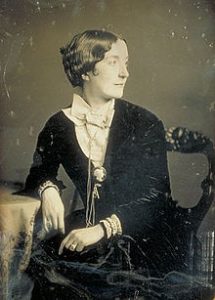
Mrs. Frederick Lander
Previously in the novel: War Secretary Edwin Stanton held President and Mrs. Lincoln captive under guard in basement of the White House. Duff and Alethia find pretending to be the Lincolns difficult, especially with Tad coming down sick. Stanton interrupts their dinner to make sure Duff is not eating too much. Alethia finds herself romantically attracted to Duff.
“Good night, Father.” Alethia tried to hide her disappointment that Duff did not offer to share his bed with her. As she went to her room, she decided it was for the best. They should not become intimate in the middle of their mission. She wiped a small tear from her cheek and thought Duff a very wise and wonderful man. Instead of undressing, Alethia quietly listened to Duff as he removed his shoes, slacks, and shirt. She clutched her bosom as she thought of him putting on his nightshirt and slipping into bed. Shaking her head, Alethia chastised herself for her silly thoughts. A knock at Lincoln’s door caused her to jump.
“Mr. President?”
“Come in, Mr. Hay,” Duff said.
“I wouldn’t bother you so late, Mr. President,” Hay said, “but I heard something tonight that I thought you needed to know immediately.”
Alethia wrinkled her brow and went to the door to eavesdrop more efficiently.
“I was at a party…”
“Where was it?” Duff asked.
“At the home of Colonel Frederick W. Lander,” Hay replied. “You know him. The civil engineer.”
“Of course. Last I heard he was wrestling with a bout of influenza.”
“He still is. He remained in his room the entire evening. The event was a fund-raiser hosted by his wife for the federal hospitals at Port Royal, South Carolina.”
“She was an actress or something like that, wasn’t she?” Duff said.
“An angel on stage,” Hay gushed. “When I first came to Washington I was quite smitten with her. Along with many others. She had many suitors.”
Not unlike Rose Greenhow, Alethia thought. Her mind often wandered to her childhood friend and wondered if she had ever escaped prison. She knew for certain Rose had not been executed, because she would have read about it in the newspapers.
“Even Mr. Stanton, before he remarried,” Hay added, “if that can be imagined.” After an embarrassing pause, he continued, “But that’s not what I came to say. During the evening Mrs. Lander sat beside me on her davenport and told me of meeting a brash young actor at an opening-night party at Grover’s Theater—a Virginian, I believe she said—who was trying to impress her with a story about some scandalous activity he was planning with friends that would make the front page of every newspaper in the nation.”
“And what might that activity be?”
“She said he didn’t elaborate, but from his tone and manner she drew distressing conclusions.”
“Which were?”
“Kidnapping, sir, possibly assassination.” Hay cleared his throat. “Of you, Mr. President.”
The concept of losing Duff to assassins caused Alethia to lurch into the room. Thinking better of intruding into the conversation, she decided to be startled.
“Oh, Mr. Hay.” She eyed him haughtily, as she thought Mrs. Lincoln would.
“He was telling me about a party,” Duff said.
“And to give the president a gift. Going through the buffet line, I noticed a large bowl of licorice.” He pulled a handful of the black candy from his pocket and placed it on the nightstand. “I thought he might like some.”
“Oh.” Alethia sniffed. That terrible stuff. He won’t eat decent food but turns his teeth black with that disgusting candy.”
“Now, Mother, you know it’s my only vice.” Duff looked at Hay and smiled. “Thank you, Mr. Hay. That was very kind of you.”
Both Alethia and Duff noticed Hay staring at the top of Duff’s open nightshirt.
“Is anything wrong?” Duff asked.
Hay paused, shook his head, and smiled, saying nothing. Alethia caught her breath, stepped forward, and then laughed.
“Oh, I know what you’re thinking, seeing Mr. Lincoln shorn like a sheep,” she said blithely. “But he has a cold coming on, and I absolutely refuse to rub ointment on that dreadful, hairy chest. So he must shave every time he feels under the weather.”
“Yes.” Duff coughed.
“You’ll keep our little secret, won’t you, Mr. Hay?” Alethia fluttered her eyes.
“Of course, ma’am.” Turning a light pink, Hay backed up.
“We’ll discuss that other matter tomorrow,” Duff said.
“Yes, sir.”
“I really don’t think there’s anything to it,” Duff added. “Just chatter at a party.”
“I hope so, sir.” Hay backed to the door, fumbled with the knob, then left.
Listening for Hay’s receding steps, Alethia and Duff smiled.
“At least you got the licorice.” She nodded at the nightstand.
“Yes.” Duff picked up a piece and looked at it. “It’s the one thing I absolutely can’t stand to eat, and I must.”
Burly Chapter Two

(Previously in the book: Herman anticipated fifth birthday on the plains of Texas during the Depression.)
One night after supper, mother cleared away the dishes and brought out a small chocolate cake—Herman’s favorite—with six flickering candles on it. She and Callie sang happy birthday while his father and Tad sat there and pretended to mumble the song. Herman had actually forgotten his birthday. But when he blew out the candles and tasted the sweet chocolate cake he remembered—only for a second—what his mother had said about a teddy bear. After everyone had finished the cake, his mother with a beaming smile on her face pulled out a bundle wrapped in butcher’s paper.
“I colored pictures on the wrapping paper,” Callie announced proudly.
For a nine-year-old girl with too many freckles she was very nice, Herman thought.
“What! He gets a present!” Tad exploded.
“Be quiet, son,” his father said softly but firmly.
“But he don’t do half the work around here that I do, and he don’t have to go to school!”
“Oh, shut up, Tad,” Called chided her brother.
“You shut up,” he retorted.
Tad was a big twelve-year-old but he looked like a pouting baby when he was angry, which was too often, Herman believed.
“Now both of you settle down before I take you out behind the barn,” their father warned.
“But it isn’t fair,” Tad whined.
“Shush,” his mother added, handing the gift to Herman.
“Not fair,” Tad said under his breath.
Herman was sad his brother was mad, but he put that out of his mind as he tore into the paper and what he found made him grin from ear to ear.
It was a bear made of burlap with buttons sewed on his arms and legs so that they could move. He had a sweet little smile sewn on his face. Two more buttons made the eyes.
“Ooh, how pretty!” Callie cooed, hugging Herman. “Isn’t it wonderful, Herman?”
Herman was speechless.
“Mama made it,” Callie told him.
“It was your father’s idea to use the burlap bag,” their mother said, smiling sweetly and nodding to her husband.
Herman jumped up, without thinking about the worms on his father’s arms, and ran over to hug him and kiss his rough, weather-beaten cheek. For the first time he could ever remember, he felt those long, strong arms fold gently around him and pat him softly. He stood quickly.
“Um, I’ve got to go see how the livestock’s doing,” he mumbled, rubbing his eyes with his hands and walking with long strides out the door.
Mother rubbed her eyes with a towel. “Time to clean up,” she announced crisply. “Callie, clear away the dishes.”
“Mama, can I play with my bear?” Herman asked timidly.
“Of course, dear.”
“What are you going to name him, Herman?” Callie said excitedly, leaning down to look at the bear.
“I don’t know,” he replied simply.
“Why don’t you name it after yourself,” Tad said with a nasty sound in his voice. “Baby.”
“Oh, shut up,” Callie spat, then turned back to Herman. “Since he’s made out of burlap, why don’t you call him Burly?”
Herman smiled. “Yeah. Burly Bear.”
“Mama,” Tad began to complain, “It ain’t fair Herman gets fancy toys and I—“
“It isn’t a fancy toy,” his mother interrupted. She sighed deeply, then pinched her pinched together. “And whether it’s fair or not—well, I’m just too tired to worry about it. Times are might hard, children. Things aren’t fair for just about everyone. Maybe Mr. Roosevelt can do something about it but for now, let’s just try to get along and survive.”
Herman turned for the loft ladder when Tad jumped in front of him, pointed his finger and made a silly face. “Baby, baby, baby,” he said in a cruel sing-song voice.
Callie ran over and kicked Tad in the shins and screamed, “You’re so dumb and awful! I hate you!”
Tad yanked Callie’s long, stringy hair. “Oh stay out of this!”
Tad and Callie began to fight and scream but stopped very fast when their father came through the door and bellowed, “Hey! What’s goin’ on here?”
Both of them tried to tell their side of the story but since they were talking at the same time their father couldn’t understand either one. “All right,” he announced, “I’ve had enough of this. You’re both going out behind the barn.”
With muffled protests Callie and Tad went out the door with their father. Herman was glad he kept his mouth shut because he knew what awaited them behind the barn, a paddling.
“Why does Tad always call me a baby?” Herman asked his mother.
She smiled and hugged him. “Why, you are the baby of the family. And you’ll always be my baby, even when you’re grown and as big as papa.”
“Gosh, will I be that big?”
“Yes. Now get ready for bed. Take Burly with you.”
David, Wallis and the Mercenary Chapter Thirteen

Disappearing on the street in Shanghai.
Previously in the novel: Leon, a novice mercenary, is foiled in kidnapping the Archbishop of Canterbury by a mysterious man in black. The man in black turns out to be David, better known as Edward the Prince of Wales. Soon to join the world of espionage is Wallis Spencer, an up-and-coming Baltimore socialite. David seduces a diplomat’s wife on a slow boat to China.
On a lower deck of the HMS Wyndemere Leon began to rouse from his sleep. By 1925 he had been on many missions for the organization but this was his first voyage to the Far East. He kept focused on creating memories to share with his mother. He could not tell anyone else in the village about his job, not even old Joe. Nor could he keep a journal of his travels. If anyone from the organization discovered he had a written record, no matter how inconsequential, he would be summarily executed. He smiled at the absurdity of it. He never knew anything to write down. For this assignment he found the necessary tickets in a pot outside his front door. First a ticket from Nassau to Panama and another from Panama to Shanghai. In China he would receive further instructions. What or from whom he did not know.
Leon glanced in the mirror and was not pleased. He looked like a clean respectable beach boy from the Bahamas, a step up from a scruffy young fisherman walking home after a long hard day on the boat in the Caribbean. Leon wanted the appearance of one of those mysterious men dressed in white linen suits, who lingered in the corners of the Nassau casinos puffing on imported cigarettes.
He could not chastise himself too much. Leon provided well for his mother and sisters. They didn’t have to be servants any more. His bank account was growing. He could afford a proper home. He had even taken a wife, a girl he had known all his life. She had laughed with him as they played in the surf. She cried with him when his father died. And now she was bearing his first child. His life of sin had been good to him. But he still wanted a white linen suit.
A day later HMS Wyndemere landed in Shanghai. A buzz from the gang plank at the other end of the liner drew his attention. Photographers held high flash powder trays and set them off at a slender elegantly dressed young man, posing at the bottom of the plank with a cigarette between his fingers. Leon looked away at the street to see a rickshaw with a coolie standing in front holding a sign, “Eleuthera.”
He walked to it, climbed in without a word, and endured a short, choppy ride to a hotel, a more respectable hotel than he was used to. That evening he ate in the proper dining room. Next to him were two older British gentlemen who had drunk more brandy than they should.
“Ambassador Chatsworth landed today,” one of them said.
“Is that so, Geoffrey?” the second replied, choking on his snifter. “What in the deuce is he doing here?”
“It’s that Shanghai Massacre mess last month.”
“Oh yes. The embassy mucked that up, didn’t they?”
“Yes, the embassy chief should be sacked,” Geoffrey announced.
“Wouldn’t that be admitting culpability? The King can’t have that, Liam.”
“I suppose you’re right, but it’s a bloody mess if you ask me.”
“You know who must be chortling over this? The damned opium overlords. As long as the government is in disarray they can do as they bloody damned please.”
Leon wiped his lips with a napkin and pushed away his plate. Perhaps that was why he was in Shanghai, to assassinate the British embassy chief to ensure continued political confusion. The waiter presented his check and moved on. Leon didn’t even look at him. When he examined the total he noticed in small letters at the bottom: “tomorrow noon marketplace.”
The sun was overhead and insufferably hot as Leon entered the bazaar. He wandered about looking at useless merchandise. The stuff sold in Freeport was better made and sold at cheaper prices. One show that caught his attention was a belly dancer. From what he could tell, under all that makeup was a Caucasian woman, skinny and not all that pretty. But she could move her hips and balance a sword on her head.
“Sir, sir,” a voice called to him. “Over here. Finest wood carvings from the Bahamas.”
Leon recognized the cue aimed at him. A toothless Chinese man extended a statue of a naked man and woman embracing. The man was too skinny and the woman’s bosom was too large. Leon waved it away, but the man pulled him closer.
“Look, look. See? Much better.”
As Leon regarded the rest of the merchandise the man slipped a small revolver in his pocket. He jerked away and walked behind a tall stack of Indian rugs. Slowly pulling the gun from his pocket, Leon read the note which stuck out of the barrel:
“Short fat bald white man in linen suit.”
This would be the day he would die. Leon knew there was no way to shoot a man in a crowded open space and escape unscathed. He hoped, at least, his mother would be properly compensated. Leon chose not to dwell upon his fate but rather chose to do his job well.
A clamor arose across the marketplace. He walked fast and with determination toward it. As Leon pushed his way through the crowd he spotted a short, fat, bald, white man in a linen suit. From the whispers around him, Leon realized this was the British embassy chief who had ordered the attack on the Shanghai students. The idle chatter he heard over dinner had been correct. With a deep breath, Leon pulled his revolver and took careful aim.
Out of nowhere a hand swooped down, knocking his gun away. An elderly Chinese man pushed him back into the crowd before storming toward the ambassador. The old man shouted a gibberish, a mishmash of Chinese dialects. The old angry man got close enough to spit on the official’s face.
“Look! Look! “A voice erupted from the crowd. “Man with gun! Look! Look!” People pointed in Leon’s direction.
The old Chinese man rushed Leon, pushing him away. “No complications!” the old man muttered.
Leon recognized the voice from years before. It wasn’t an old Chinese man. He was the man from Canterbury Castle. What was he doing there?
Police whistles blew. Uniformed Shanghai officers chased after them. As they ran by the belly dancer, she let her sword skip along the cobbled market place, causing the crowd to scatter, blocking the approach of the police.
The man grabbed the gun from Leon. “You don’t need that,” he grunted, pushing Leon down a narrow alley while he raced down the main thoroughfare.
Leon hid in the shadows and watched the man start taking off bits of his disguise until he revealed the persona of an ordinary British tourist, who leaned against a wall and lit a cigarette to watch the police run past.
That night Leon sat in the hotel dining room wondering how he would he get home. As usual his first tickets were one way. The room had been paid for one night. After he paid, he had no more cash on him. Leon berated himself for still thinking of himself as a street thug who mindlessly killed people so he could afford his next meal. He had money. He did not have to live like that anymore. He should learn to bring his own money on his assignments to deal with situations like this. A young Chinese woman dressed in a short dress flounced up and sat next to him.
“Hey, pretty boy. I give you good time.” Her hand went under the table and shoved a thick envelope between his legs.
The maître d arrived. “Excuse me, sir. She’s on her way out.”
She quickly leaned in to whisper in a completely different voice, “He’s dead. Good job.”
After the maître d dragged her off. Leon looked inside the envelope which included ship passage home and a huge stack of cash which he prudently chose not to count at that moment.
David, Wallis and the Mercenary Chapter Eleven
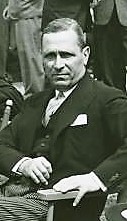
Felipe Espil, one of Wallis’s lovers
Previously in the novel: Leon, a novice mercenary, is foiled in taking the Archbishop of Canterbury hostage and exchanging for an anarchist during the Great War by a mysterious man in black. The man in black turns out to be Edward the Prince of Wales. Soon to join the world of espionage is Wallis Spencer, an up-and-coming Baltimore socialite.
Wallis stopped abruptly when she heard his subtle mention the words “hat pin.” Now how the hell would some little bastard from England know about that? She fumbled with her purse as she pulled out another cigarette. For the first time in her life, her fingers trembled. The man offered her a light.
“What did you say?”
After lighting her cigarette, he remained uncomfortably close and whispered, “We’ve read the military dossier on you and Win. The American jackasses don’t believe it, but we do. Also we’ve had collaboration from the Argentinian Embassy. Don’t worry. Felipe Espil is very discreet, but he did think we’d be interested in your many talents. And we are.”
“I’m sorry. You’re confusing the hell out of me. I am an American in Paris who is attending a party at the American Embassy. You tell me you know about my—shall we say friendship with an ambassador from Argentina. So just the hell are you?” She blew smoke in his face.
He took her by the elbow. “Let’s take a stroll in the gardens. Americans are very clever at growing flowering bushes, if not anything else.”
Wallis yanked her arm away and resisted the temptation to inflict permanent harm on his little British body. “You have some bollocks to manhandle me like this!” she spat.
“His Majesty’s secret service.”
They maneuvered their way through the crowd, onto a broad balcony and down marble steps to a garden reeking with lilacs and filled with dark shadows perfect for talking espionage.
“Let me properly introduce myself. I am Gerry Greene and officially a member of the diplomatic corps, but my actual affiliation is with MI-6. You do know what MI-6 is, don’t you?”
“Why should I?” She blew smoke in his face again.
“Oh dear. I have to be blunter with you than I had wished.”
“I prefer it that way.”
“The British Empire has two sections to its intelligence organization. Domestic cases are handled by MI-5. International cases are handled by MI-6. And MI-6 wants you to spy for Britain.”
Her high pitched guffawing broke the proper atmosphere of the embassy garden as if a firecracker exploded. “You must be kidding!”
“We know about your Uncle Sol, Winfield Spencer and many others. You have invented a new singular use for a hat pin that will never be patented. Life in the woods of the Blue Ridge Mountains taught you what can be accomplished with exotic plants. Your memorable methods of mayhem are quite impressive. The finest part is like a deadly virus. You are uniquely bereft of morals.”
“That’s a nasty way of putting it.”
“But still true.”
Wallis threw down her cigarette and smashed into the garden dirt. She took an extra moment to find the best words to respond.
“I’m American. I’d love to be British but sadly I’m not.”
“It makes no difference to us. Your country clings to old-fashioned ideas about patriotism and a woman’s place—“
“But I’m not a woman,” she interrupted.
“We know. That’s why you captivate us.”
His smile annoyed Wallis. “What’s in it for me?” She didn’t know if she were tiring of the conversation or being sucked into the possibilities of an even more glamorous and profitable lifestyle.
“Money unlimited. Enough to buy all the pretty things you love. Living in the finest hotels and mansions in the world is possible.”
The word money hooked Wallis’s attention. “When does this money start showing up in my bank account?”
“Immediately. Greene stepped closer. “And more important than money, this job offers you the opportunity to torture and kill men to satiate your intrinsic hatred and lust.”
She loathed this man for knowing what lurked inside. Like a peeping tom he saw into her soul. “So what do I have to do? Pass some dreadful test or something?”
“First you have to reconcile with Win and move with him to China. Don’t worry. We have a more suitable cover for you. In a couple of years you can divorce your husband. Marry someone else but eventually you will marry the man who will become your partner.”
“You’re choosing the men I will marry?”
“Does it make any difference? You haven’t done that well on your own.”
“How rude of you to remind me.”
“I must impress upon you. This is a life-long commitment which requires enormous amounts of patience. And that life time may be very short.”
“Thank God. I’d hate to be bored.” Wallis shrugged her shoulders and glanced around the garden as if she were bored right now.
“Then listen carefully.” Greene lowered his voice close to a whisper. “You will receive a telegram from Win begging for reconciliation. Don’t ask how but recently someone has convinced him an impressive promotion would be his if he proved himself to be happily married.”
“Is it really true? About the promotion, I mean?”
“Do you care?”
“No.”
“Once you join Win in China you will meet a charming man by the name of Robbie who will offer you a guided tour of China’s most fascinating—and might I add, most sinful—cities where you will be taught the most intricate of oriental martial arts.”
“I hope it involves something kinky.”
“The Chinese do not have a word for kinky. “
“Oh.”
“Just because they don’t talk about it doesn’t mean they don’t know what it means.”
David, Wallis and the Mercenary, Chapter Ten
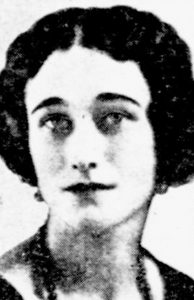
What went on behind that mysterious gaze?
Previously in the novel: Leon, a novice mercenary, is foiled in taking the Archbishop of Canterbury hostage and exchanging for an anarchist during the Great War by a mysterious man in black. The man in black turns out to be Edward the Prince of Wales. Soon to join the world of espionage is Wallis Spencer, an up-and-coming Baltimore socialite.
Wallis had now been married five years to Win Spencer and was having a marvelous time. Whenever she walked into the room she was certain Win peed himself a bit. He had learned the hard way he could never assert himself with her. If he forgot himself and tried to slap her, she would dodge his hand and thrust a knee into his crotch, then ram the base of her palm under his chin, causing him to bite his lip and bleed. Wallis followed that action with a hard kiss on his lips, transferring his blood to her mouth. Immediately she ran out of the house screaming. A few times the Army almost gave Win a dishonorable discharge for abusing his wife, but Wallis pleaded through tears to save his job.
“After all, Win is the best pilot you have. It would be unpatriotic of me to deprive my country of one of its best simply because he can’t handle his liquor and knocks me around a bit.”
“You have quite a wife there, Spencer,” his commanding officer lectured him. “You should be grateful she hasn’t pressed charges.”
Sometimes Wallis amused herself with her hat pin up a delicate portion of Win’s anatomy. She had grown more sophisticated since her days with Uncle Sollie. She lost quite a bit of respect for Win; after all, a man should be able to endure a certain amount of inconvenient pain without tears.
By 1921, Win pleaded with Wallis for a divorce because he could no longer take the physical abuse. “I am actually becoming an alcoholic,” he told her from the dining table one night. He had tears in his brown eyes.
“What of it?” she asked, blowing cigarette smoke out of the side of her mouth. “Everybody thinks you’re a drunk anyway.”
“Please give me a divorce,” he whimpered. “I don’t care if it does ruin my career.”
She hated him all the more for his begging. Wallis didn’t want to stay with him, but she needed the money. Designer dresses didn’t come cheap.
“I have a compromise,” she said with a smile and another puff on her cigarette. “Pay me two hundred twenty-five dollars a month and I’ll move out and leave you alone.”
Win’s eyes widened. “Two hundred twenty-five dollars? Why, that’s most of my salary.”
“You don’t need it. Without me you can live on base and eat in the mess hall. Don’t tell me you have a clever palate. I’ve seen what you eat.”
Win sat dumbfounded, staring at her. Within a month, Wallis and her aunt Bessie were living in Washington on the monthly stipend. And quite well. Wallis began an affair with Felipe Espil, secretary at the Argentine Embassy. He was quite worldly and adapted quickly to a romance which did not include traditional aspects of lovemaking. More importantly, his family was wealthy, and he shared money with ease and grace.
Wallis feared that she confided too much as they lay in bed during early morning hours. They passed a cigarette between them, and she described her unconventional marriage with Win including its more sadistic aspects. Espil briefly considered the hat pin experience but declined.
“No one really likes it,” Wallis warned him, “except me.”
Eventually, Espil’s wealthy family informed him they expected an heir, a duty Wallis was ill equipped to execute. Her heart broke a bit. Espil was the first man who truly gained her respect and his family’s wealth could not be easily discounted either. At the end, however, she got over the romance but the doubts of Espil’s discretion lingered. She didn’t need the truth wafting about the cocktail party circuit where it might be heard by the wrong people.
A whirlwind of social activities across America and then on the continent made Wallis forget about Espil completely over the next three years. In 1924, she and Aunt Bessie invaded France and captured the hearts of Paris upper crust. Sir Cecil Beaton, the famed photographer, took her on as his greatest challenge–how to capture her image without making her face look like a horse and how to keep her hands from looking like they belonged to a longshoreman.
One evening at the American Embassy, Wallis sat languidly in an open window puffing on a cigarette for no particular reason, other than she thought it made her look mysteriously glamorous. A handsome young man approached her. He wore a tuxedo and his hair was slicked back. Oh God, she thought, not another one.
“You’re Wallis Spencer, aren’t you?” he asked with a seductive upper-class British accent.
She barely managed a smile. “Have we met?”
“No. You’re quite well known. The wife of America’s ace military aviator.”
Wallis blew smoke in his face. “I can’t believe poor little Win Spencer is an international celebrity. He just teaches others to fly. And I’m a country girl from Baltimore.”
“Oh, you’re much more than that.” His eyes twinkled. “Everyone knows about your uncle Sol Warfield. He’s quite an inventor, isn’t he?”
“I was being ironic.” She flicked her cigarette out the window. “You may think you’re debonair in your rented tuxedo, but you are nothing. I have thrown away better men than you will ever be.” She paused and became quite irritated when he continued to smile at her. “How rude must I be?”
“Oh, I’m hoping for much, much worse.”
Wallis stood and prepared to march away when the young man said just two words.
“Hat pin.”
Lincoln in the Basement Chapter Thirty-Four
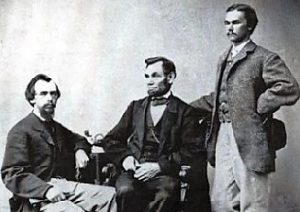
Lincoln and secretaries, Hay and Nicolay
Previously in the novel: War Secretary Edwin Stanton held President and Mrs. Lincoln captive under guard in basement of the White House. He guided his substitute Lincoln through his first Cabinet meeting. Then he told Lincoln’s bodyguard Ward Hill Lamon into believing Lincoln and his wife were in hiding because of death threats. Lamon comes to the White House to find out for himself.
Nicolay and Hay have not changed, Lamon thought, as he entered the room. Hay looked up from his desk where he was addressing envelopes, and smiled broadly.
“Hello, Ward.”
“Ward, we haven’t seen you in a while.” Nicolay said as he looked up from his letter opening. He smiled only briefly, yet Lamon took it as a warm reception since it came from the cold, bland Bavarian.
Lamon sat near Hay, throwing his feet up on the desk, as was his wont during Lincoln’s first year, when all was normal. He liked the secretaries immensely, Hay’s boyish charm and Nicolay’s reserved intelligence; still, Lamon had to learn what they knew about the president’s disappearance.
“Marshal’s office has been keeping me busy.” He looked from one to the other. “You two look no worse for the wear.”
“Thank you,” Hay replied, “and same to you.”
Taking a deep breath, Lamon continued, “I wish I could say the same about the old man.” His observation was met with silence. Perhaps he was being too subtle, so he turned directly to Hay, whom he considered the weak link. “Johnny, haven’t you noticed a difference in Mr. Lincoln?”
“Remember when we used to have booger-flicking contests?” Putting a finger up one nostril, Hay innocently returned Lamon’s gaze. “You always won.”
Lamon could not help but laugh, realizing, however, that Hay had not answered his question, deliberately or not, so he turned his attention to the inscrutable Nicolay.
“And you, John, have you noticed any changes in the president?”
“Mr. Lincoln hasn’t changed since those days in Springfield when we all first met him.” Ripping open a letter, Nicolay studiously read the contents.
“Those were the good old days with the president, weren’t they?” Lamon asked.
“Yes, Mr. Lincoln smiled more then,” Nicolay replied.
“Even the first year in the White House, the president made a few jokes,” Lamon continued.
“That was when we all, including Mr. Lincoln, still had hopes of an early resolution to the war.”
Narrowing his eyes at Nicolay, who kept his attention on the letters, Lamon then asked, “But since the time I saw him last, two months ago, Mr. Lincoln seems to have lost his spirit.”
“The president has had good days this fall. You just haven’t seen them.”
“Well, I guess I’ve been lazy long enough,” Lamon announced, putting his feet down and standing.
“Don’t be a stranger,” Hay cheerfully said.
“Ja, come back soon,” Nicolay added, finally raising his eyes.
Lamon walked out, very proud of himself, feeling he had outfoxed Nicolay, who did not want to tell a lie, yet did not want to betray a confidence, but by playing his word games had revealed what Lamon wanted to know. In talking about Lincoln, Nicolay called him by his name; however, when Lamon referred to the man in the president’s office as Mr. Lincoln, Nicolay followed up by calling the man Mr. President. That proved they knew the current president was not Mr. Lincoln; what Lamon still did not know was if they knew this was the plan of Mr. Lincoln, the man they called Mr. President, or, worst of all, Mr. Stanton.
David, Wallis and the Mercenary Chapter Nine

Eleuthera at night
Previously in the novel: Leon, a novice mercenary, is foiled in taking the Archbishop of Canterbury hostage and exchanging for an anarchist during the Great War by a mysterious man in black. The man in black turns out to be Edward the Prince of Wales. As his voyage home to the Bahamas, he recalls his early life, including his father’s death and working for the mysterious Ribbentrops.
(Author’s note: this chapter contains mature situations.)
For the next few weeks Leon spent hours wandering the grounds. His first suggestion was to replace the gate of iron bars with thick wooden doors. No one could shoot through wooden doors and make a quick getaway. Mr. Ribbentrop agreed and promptly made the changes; however, when Leon also recommended cementing broken bottles to the top of the wall, the master rejected it because he thought the house would look more like a prison than a home.
One day Mrs. Ribbentrop told Leon she felt like going to the market and asked him to accompany her. As they walked among the stalls of fruits and vegetables, she said, “I hope I didn’t put you in an uncomfortable position. I mean, you indeed have many admirable qualities but …you’re so young. What do you know of self-defense? Fighting and such things.”
“You don’t know the heritage of the Johnson family, even going back to a time and place where we weren’t even Johnsons. Back in Africa, we were warriors, not very good warriors. We lost and were sold into slavery. Each man in every generation taught his sons ancient tribal skills. My father taught me secret techniques to protect myself and to kill. Your concerns, fortunately, are unfounded. I might appear young and naïve but I am capable of being a very bad little boy.”
That night Leon awoke with a start. His bedroom was just down the hall from the Ribbentrops’ suite. Instinctively he jumped from his bed and instead of putting on his pants Leon ran naked toward their room though he heard no sounds or saw any lights. Just as he entered two men come through the open window from the courtyard. He dove at them as if he were a rock from a slingshot.
His body rammed into the first intruder, the impact sent all three to the floor. Leon leapt up and saw the throat of one of the men, exposed like a turkey neck on a chopping block. He stomped on it with his bare heel until he heard the larynx crack. Then he pressed down with his full weight until the man’s face turned blue and his last breath escaped his lips.
“For God’s sake, boy!” Ribbentrop yelled as he lumbered from bed. “What the hell are you doing? Have you lost your mind?”
“Heinrich?” his wife murmured as she stirred from a deep sleep. “What’s going on?”
Ribbentrop stormed around the corner of the bed. The second intruder scrambled to his feet and lunged at him with a knife. Ribbentrop’s eyes bulged as the blade slid upward under his ribcage.
Leon turned and kicked the attacker in the back of his knee. He crumbled and dropped the knife. Leon picked it up and rammed it into the intruder’s jugular and twisted.
Both Ribbentrop and his assailant gurgled blood before falling over dead. Leon spun to the window to make sure there were not others waiting outside.
“Leon,” the wife whispered, reaching over to turn on the lamp on the nightstand, “are you all right?”
“Yes.” Caring more about what money he could find than about the life of his boss, Leon knelt by the two strangers searching their pockets. He found a few guineas and took them. “My father taught me well.” He checked her husband for a pulse. “I’m afraid Mr. Ribbentrop is dead. Your husband should have agreed to the bottle shards. They came over the wall.”
Mrs. Ribbentrop rose from the bed and neglected to put on her bathrobe on a nearby chair. A silky nightgown clung to her body. “My husband was a fool. He killed himself. Besides, they came for me. Have you heard of the Romanovs?”
“Yes, my father read the newspaper to me every day.”
“I am a cousin to the czar. We’re a ruthless family. We’ve never had a high regard for anyone’s life, except our own. Heinrich offered to marry me and take me away for a substantial dowery. So what are we going to do now?”
Leon rolled the men onto the bedroom rug. “I hope this was not special to you.”
“That’s the shame of it. Nothing is special to me. Sometimes I wish I could be horrified by blood and death.”
“I have to wrap up the assassins. I have a friend who can help me dispose of them at sea.”
“God, you are a cold-hearted bastard,” she said with twisted humor. “Do you even care the Bolsheviks are after me?”
“The Freeport authorities aren’t accustomed to triple homicides. They will bungle the investigation and be more concerned that a black boy killed two white men than the fact they killed your husband.”
“I’d explain it to them.”
‘Really? Make international headlines so the Bolsheviks will know where you are? I think you care about your own life more than mine.”
“You’re probably right.”
“I’m concerned with body disposal now.” Leon began tugging the carpet toward the door.
“What do we do about Heinrich?”
“Do you have a family physician who would rule his death a heart attack? Remember, you don’t want to make headlines.”
She smirked. “For enough money our doctor will say anything. And how did you come up with a heart attack?”
“Well, his heart was certainly attacked.” He paused. “You better call him tonight.” Leon smiled. “And yes, I’m glad I at least saved you.”
“I think I’ll move to the American West. They know how to handle Bolsheviks there.”
Leon stood and moved to the door. “I have to fetch my friend.”
She stepped over the bodies and went to him. “I’m sorry this means your job is gone. I have a large purse of gold coins in the safe. They’re yours.” She paused to mull a weighty matter on her mind. “I was wrong about you. You are a bad boy. There are jobs for bad boys. Don’t ask me how I know, but I do know. Sometime—maybe soon, maybe later—someone will approach you to do evil things for large amounts of money. That way you can support your family.” She shook her head. “I don’t know if I am doing you a favor or not.”
“Believe me. It is a favor.”
“After tonight we must never see each other again.” She paused to keep tears from forming. “I have one last request as your employer.”
“Of course. Anything.” His mind was a blank as to what she might want.
She put her hands to his cheeks, pausing to consider her white skin against his black face. She pushed her lips against his.
“God, I am a Bolshevik,” she murmured.
Leon felt a surge in his body. She put her arms around his neck. He picked her up and carried her to the bed.
Leon shook his head to stop the memory even though it was very pleasurable. Coming back to the present, he sat up in old Joe’s boat to see the Eleuthera dock. Standing on the keel, he anticipated the landing. As the boat thunked against the dock, Leon bounded ashore.
“Thank you, Joe!”
“Anytime, boy. Give your ma a hug for me!”
He ran down the dusty road, passing the now-empty Ribbentrop mansion. When he reached his family’s little house his mother greeted him at the door with an embrace.
“My little boy! How good you look!”

